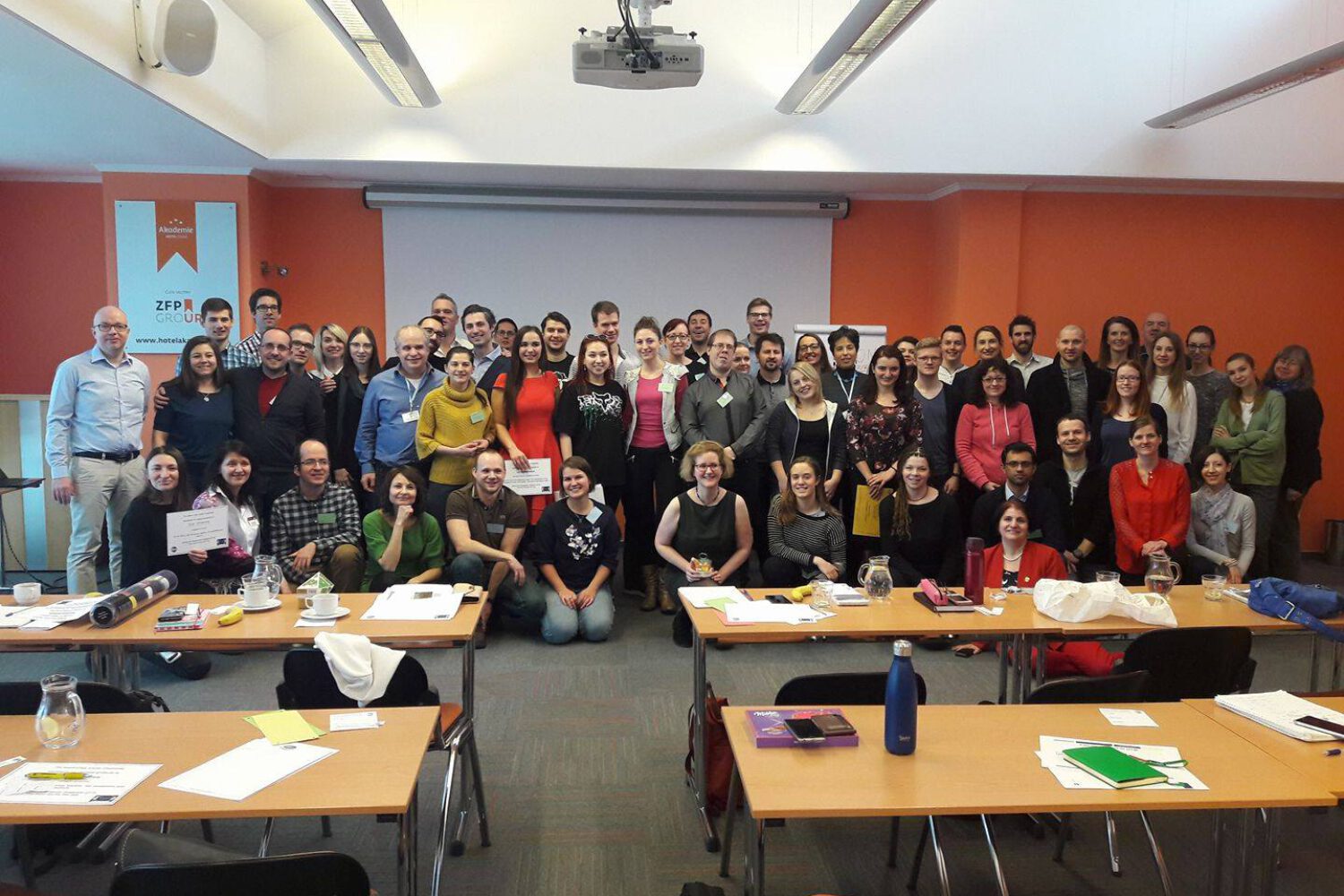Lately, I’ve heard of two professional public speaking trainers, one of them a renowned speaker as well, who belittle my beloved Toastmasters organization. For me, there are only three options: arrogance or ignorance or both.
Needless to say: I’m biased in this particular subject. Since October 2005 I have been a faithful follower of this kindhearted “cult” of public speaking fans. My club is called Prestigious Speakers Barcelona. We are 40+ members from 20+ countries. A good number of us have been with the club for more than a decade. Like our pun planting Peter from the UK or our rhetoric reaping Rose from Malaysia. For many years, we’ve been helping each other to grow as speakers, as professionals, as people. In 2009, I turned my passion into a profession. I love my organization, hence, yes: I am biased.
Since there is evident criticism out there, I will try and tackle two of the most common arguments used against us.
Argument 1: Toastmasters are non-authentic speakers
Many of our members enter the club without any or limited public speaking experience. Soon, they figure out that in order to become a great public speaker they need to acquire skills (aptitude) and their own way to apply them (attitude).
Thanks to practice and positive and constructive feedback they usually improve in four stages.
1) At the beginning of their rhetorical journey, non-experienced speakers lack both aptitude and attitude. Typical indicators are: They use notes; they use lots of filler words and sounds, and eye contact is not existent.
2) Then, they acquire their first skills. For example, they speak in a more structured way; they get to the point; they look you into your eyes to connect. Their attitude though still stumbles. At times, their speaking style comes across as artificial.
3) In a third phase, their skills reach expert level. They command the stage; they speak in dialog, not in narrative; they evoke emotional reactions by showing their vulnerability. In parallel, their attitude becomes more and more natural.
4) Finally, in a fourth stage both their aptitude and attitude are excellent. Performance and personality finally match. They have turned into an authentic performer.
Yes, I have seen Toastmasters who cross the line of authenticity. But, my dear critic, think about your own beginnings. All I can say is: Give them time!
Argument 2: What you learn in Toastmasters is not applicable in the business world
Public speaking = Content + Delivery. The before mentioned criticism of non-authenticity refers to the delivery dimension. And yes, in a logic and suit-based business environment (e.g. banks, insurance companies, consultancies), an overdose of enthusiasm can be perceived as “too much”. The solution? Time. (See above.)
But – what about content?
Is it not applicable in the business world to present a message and its supporting arguments with a logical structure?
Is it not applicable in the business world to have a clear objective in a presentation?
Is it not applicable in the business world to use rhetorical devices like metaphors to make a point stick?
Is it not applicable in the business world to use arguments based on logic, credibility and emotion to persuade clients and stakeholders with power?
Is it not applicable in the business world to tell business anecdotes to anchor the message in the minds of the clients?
In the end, what you learn in Toastmasters is nothing else but a modern version of the teachings of Aristotle & Co. And those teachings are applicable in any business environment. Period.
Thanks to Toastmasters I have turned into an authentic performer myself. Thanks to Toastmasters I could engage my former colleagues and clients at KPMG much more. So why do established professional speakers criticize Toastmasters?
I have no idea.
But I do know that it would be wise for them to join our meetings. For me, those meetings are my R&D department. Every time I learn something new. It’s fantastic!
And if you think, you know everything already, you are either arrogant or ignorant or both.


judi challiner
Excellent, logical and applicable to every facet of society.
Loving your cover photo – great bunch of Toastmasters 🙂 🙂 🙂 !
Am in process of preparing a speech about my decade in Toastmasters and the huge impact it has on my life, Will quote you to add even more value !
Thanks for inspiring me
Judi
Carsten Wendt
I love the metaphor of the R&D Department Florian. It is the same for me: every time I learn something new. Every single time.
Dennis Kunkler, DTM
No matter what organization is out there or how good it is, there are always going to be naysayers. Just like your favorite team. No matter how good or bad they are, you think they are the best. And so do the fans of every other team.
With that said, what one gets out of any organization is directly proportional to what the put in.
Toastmasters is not a passive learning experience. The more a person jumps in and actively takes part in all that it has to offer, the more they are going to get out of it – and continue getting out of it.
Yes there are other organizations that “professional” speakers belong to that are not the same as Toastmasters. Some good, some, not so much.
My bet is that there are many in those orgs. that cut their teeth in Toastmasters.
For the cost, learning opportunities and the amount of constructive feedback, I’m with you.
RE: The 2 arguments:
Argument 1: Toastmasters are non-authentic speakers
One word. “Some”. Some Toastmasters are non-authentic speakers.
Not ALL. End of argument.
Argument 2: What you learn in Toastmasters is not applicable in the business world.
You’re kidding me, Right? B.S Excuse my French. I don’t know about Europe, but here in the US there are hundreds upon hundreds of “corporate clubs”. Closed to the public. Paid for by the host company with all company members. These are major corporations. A few years back, as a Division Governor, one of my Areas was made up of 5 clubs from the same major insurance company.
They certainly saw the applicability to support all of the costs of 5 clubs.
Keep up the good work Florian. Say Hi, to our friend Olivia for me.
fm
Great comment – thanks, Dennis!
Craig Hadden (@RemotePoss)
I was a member of Toastmasters for several years, and left because some aspects irritated me more and more. One of those was trivial – the inordinate amount of clapping! Another was more serious – the narrow-mindedness of a disproportionate number of members.
For example, the latter manifests itself in widespread dogma like “Don’t end your speech by saying Thank You”. Rarely is any reason given for a statement like that. And, for instance, the fact that many of the most successful TED talks of all time end with the speaker thanking the audience isn’t mentioned.
To counter your comments on Argument 1, I’d say there are enough “career Toastmasters” who’ve been members for many years –sometimes a decade or more – who’ve stagnated.
Of course, “your mileage may vary”, as they say. So much depends on the people at the specific club you go to. But there are also systemic problems, like being rather stuck in the past. (For instance, while I was there, their corporate slides were filled with bullet points.)
Anyway, I’ve written several posts about Toastmasters, such as on the pros and cons of ending with “Thank You”, and a detailed critique of one of their official YouTube videos. Or there’s this short aside about unsolicited feedback. Your own viewpoint’s always welcome, even if it’s very different from mine.
fm
Craig, it’s always great to have constructive arguments. Otherwise, we’d never evolve and get better.
Regarding your points…
Ad 1) http://www.florianmueck.com/2012/04/16/no-thank-you – This is a rather old post. Today, my argumentation is more based on going back to the beginning through the “drainpipe”. Whatever you say, for me, the “Thank you” has nothing to do with Toastmasters. It is common sense. But then again, common sense is not so common, as Voltaire pointed out.
Ad 2) Growth is subjective. “Instead of judging others, what about me?” That’s the question I ask myself now all the time. In Toastmasters there are speakers and leaders and both. Some stagnate, some proceed faster, everyone at their pace and will. I learned to judge my own progress based on feedback.
Ad 3) If they still use bullet points, give constructive feedback.
You are right, Craig, your points are different from mine. But still, I’ll never understand how someone could be against our didactic approach: One class, no teacher, everyone grows based on positive and constructive feedback. How can you possibly challenge that?
Craig Hadden (@RemotePoss)
It’s good to debate these points, as you say, so thanks for the link etc.
I actually had to look up the meaning of didactic. The definitions shown were these (with bold added by me): “intended to teach, particularly in having moral instruction as an ulterior motive” and “in the manner of a teacher, particularly so as to appear patronizing”. After my experience of Toastmasters, those seem so fitting!
Re positive and constructive feedback, too often it’s sadly neither (as I mentioned on that link I posted earlier).